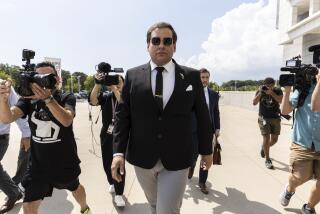Case could hinge on a single word: ‘knowingly’
- Share via
Barry Bonds, baseball’s controversial home run king, displaced Henry Aaron in the record book in August. Now, he joins less distinguished company: prominent Americans, including Martha Stewart and I. Lewis “Scooter” Libby, who have been prosecuted for lying during a federal investigation.
A federal grand jury in San Francisco indicted Bonds on four counts of perjury and one count of obstruction alleging that he “knowingly and willfully” made material false statements regarding his use of anabolic steroids and other performance-enhancing substances during his grand jury testimony in the long-running probe into the Bay Area Laboratory Cooperative, known as BALCO.
Bonds was given a grant of immunity during his 2003 testimony guaranteeing that nothing he said, and no information derived directly or indirectly from his statements, could be used against him in any criminal trial.
But there was one big exception: If he committed perjury or made a false declaration, he could be charged. Although an indictment is merely an allegation, Bonds now faces the possibility of spending several years in prison.
Veteran Los Angeles defense lawyer Brian O’Neill said he didn’t believe prosecutors were “going after” Bonds “to get him one way or another. . . . This is not like Al Capone,” he said, referring to the Chicago mobster convicted on tax charges. O’Neill had a client who was called before the BALCO grand jury, gave testimony and was not indicted.
“The prosecutors were very honorable” O’Neill said. “It was my impression they were seeking to make a case on BALCO and Victor Conte for supplying steroids and HGH,” human growth hormone.
“They were disappointed and surprised at Bonds’ answers,” O’Neill said. “They expected Answer A and they got Answer B.”
Nonetheless, several legal experts emphasized that proving a perjury case is not an easy task.
“Most criminal lawyers will tell you perjury is the single hardest thing to prove,” said San Francisco defense lawyer Doron Weinberg.
Loyola Law School professor Laurie Levenson, a former assistant U.S. attorney, said prosecutors have to show that Bonds “knowingly lied” and did not merely misspeak or stumble after misunderstanding the questions.
Bonds has stated that he used a product called “the clear” that he received from longtime personal trainer Greg Anderson but said that he was told it was flaxseed oil. “They need to show that he knew darn well that he was using steroids and not just some kind of exotic cream,” Levenson said.
Several legal experts said it would be easy for the government to prove one of the elements of a perjury conviction, “materiality.”
“Materiality is a very low burden for the government,” said New York University law professor Stephen Gillers. “In lay language, it means does the answer matter?” Gillers said.
Columbia University law professor John C. Coffee Jr., a white-collar crime specialist, said the tougher task would be to prove the other element -- that Bonds knowingly made a false statement with the intent of misleading the grand jury.
“You can imagine the defense putting on expert witnesses about how Bonds could have believed this was some of exotic” but legal product, Coffee said.
Legal experts said the question then would become: What information does the government have to counter Bonds’ explanation?
“Does the government have documentation from BALCO logs or other records?” Levenson asked. “Or has the government gotten witnesses that they did not have before?” she wondered.
The release of Anderson from federal prison, shortly after Bonds’ indictment was announced, raised speculation that the longtime trainer had decided to testify against the ballplayer, a friend since their youth together near San Francisco.
Anderson was serving his second contempt sentence, stemming from his refusal to testify before the BALCO grand jury. His lawyer denied that he was cooperating with prosecutors.
Other witnesses may have come forward, Levenson said, pointing to some “little clues” in the indictment. Particularly intriguing, she said, was Count 2. It cites as a “false material declaration” Bonds’ answer when asked if Anderson ever gave him anything “that required a syringe to inject yourself with.”
Initially, Bonds responded, “I’ve only had one doctor touch me. And that’s my personal doctor.” The prosecutor persisted: “So no one else other than perhaps the team doctor and your personal physician has ever injected anything into you or taken anything out?”
Bonds answered: “Well there’s other doctors from surgeries. . . . Sure there are other people that have stuck needles in me. . . .” Finally, the prosecutor asked, “The team physician, when you’ve had surgery, and your own personal physician. But no other individuals like Mr. Anderson or any associates of his?” Bonds responded, “No, no.”
Levenson said she would like to know whether the “associates” are prepared to testify that Bonds lied.
Prosecutors have made perjury charges stick in other cases. Libby was convicted last March of perjury and obstruction of justice, stemming from an inquiry into the leak of the identity of CIA agent Valerie Plame. Stewart was convicted in March 2004 of conspiracy, obstruction of justice and lying to investigators probing insider trading.
--
More to Read
Go beyond the scoreboard
Get the latest on L.A.'s teams in the daily Sports Report newsletter.
You may occasionally receive promotional content from the Los Angeles Times.










